In this article:
Everyone suffers from some degree of hair loss during their lifetime, but some have it worse than others. It is natural to shed some hair on a daily basis, but excessive hair fall can lead to hair thinning and even bald patches if left untreated. (1)
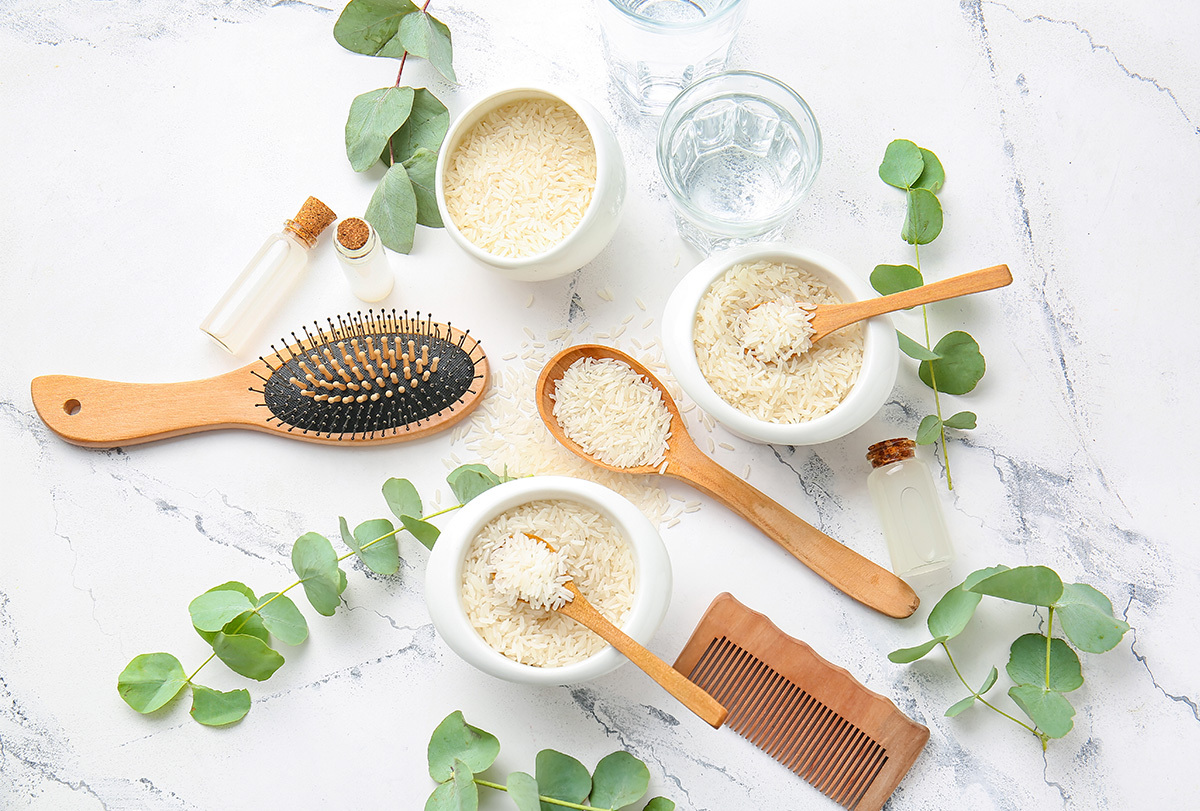
Although there are several ways to stimulate hair regrowth, it can be very difficult to achieve the same volume as before. The greater the hair loss, the harder it will be to reverse. Therefore, treating the problem early is the best way to prevent permanent hair thinning or balding.
Many different factors can trigger hair fall, and the treatment varies accordingly. A dermatologist can help you get to the root of the problem and prescribe the appropriate treatment, which typically includes medication, hair care products, dietary interventions, and lifestyle changes.
In severe cases, the doctor may even recommend hair transplants or other clinical procedures.
This article will list a few home remedies that can be used in conjunction with your doctor-prescribed treatment to promote hair regrowth.
Home Remedies to Address Hair Thinning and Balding
The following natural remedies can help manage and minimize hair thinning and balding to ensure healthy hair growth.
1. Massage with onion and coconut oil
Coconut oil and onion juice help improve hair health in their own ways, but you can use them together to get the best of both. For instance, massaging your hair and scalp with this blend can help promote hair growth and reduce hair fall.
Coconut oil is loaded with medium-chain fatty acids such as lauric acid, capric acid, and caprylic acid that exhibit significant anti-inflammatory and antimicrobial properties. (2) It gets quickly absorbed into the scalp and cuticle to provide deep hydration and nourishment. Plus, it soothes scalp inflammation which allows the hair follicles to receive proper nourishment and work properly.
Onion juice, on the other hand, is replete with sulfur which is used by the body to make the hair-building protein called keratin. Thus, more sulfur leads to thicker, stronger, and longer hair.
Like coconut oil, onion juice is also credited with anti-fungal and anti-bacterial properties that help prevent and fight scalp infections. (3) Scalp infections, if left unchecked, can destroy hair follicles leading to severe hair loss. You need a healthy scalp to support healthy hair growth.
How to use:
- Pour 2 tablespoons each of onion juice and coconut oil in a bowl, and add 2–3 drops of tea tree oil if you want.
- Mix all the ingredients well so that they completely blend together.
- Apply this mixture all over your hair and scalp.
- Gently massage it into the scalp for 5–10 minutes using your fingers.
- Wait for about 30–45 minutes before washing it off with a mild shampoo followed by conditioning.
2. Spray with rice water
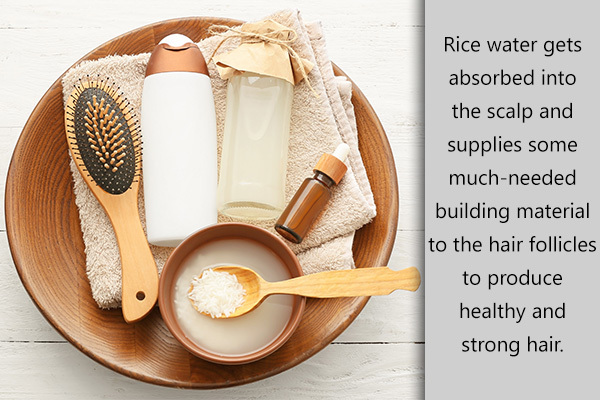
Hair is made up of protein, and rice water contains amino acids that are building blocks of protein. Thus, this topical remedy gets absorbed into the scalp and supplies some much-needed building material to the hair follicles to produce healthy, strong hair. This leads to minimal hair loss and fast, dense hair growth. (4)
How to use:
- Take 1 cup of long-grain organic rice in a bowl, and rinse it thoroughly to get rid of any impurities. You can use white, brown, or jasmine rice.
- Pour 2 cups of distilled water or reverse-osmosis (RO) water over the rice.
- Seal the bowl with plastic wrap and keep it in the refrigerator for 1–2 days for the fermentation process.
- Strain the refrigerated rice water into a clean bowl, which will appear cloudy or milky due to the nutrients released from the rice.
- Transfer the rice water into a spray bottle.
- After shampooing and conditioning your hair, spray the rice water all over the scalp and hair and a little extra on the areas with sparse hair growth.
- Wear a shower cap to avoid dripping and leave it on for 30 min to 2 hours.
- Rinse your hair with normal water.
3. Massage with rosemary oil
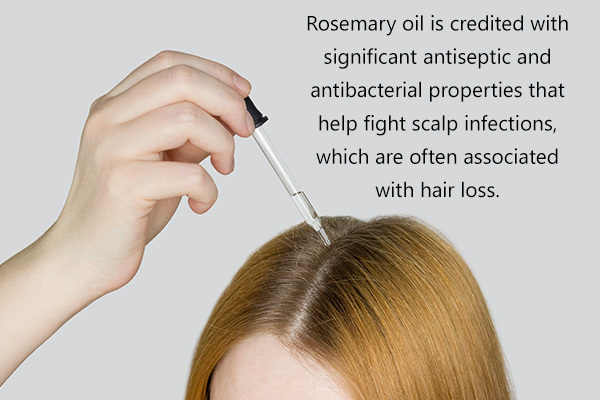
Applying rosemary oil directly on the scalp helps stimulate hair follicle activity, which leads to fast hair growth and regrowth.
Rosemary oil is also credited with significant antiseptic and antibacterial properties that help fight scalp infections, which are often associated with hair loss. (5) Plus, it works as an antioxidant to relieve scalp inflammation, dryness, and flakiness, which also contribute to hair fall and hinder hair growth.
How to use:
Method 1
- Mix 3–4 drops of rosemary oil in ¼ cup of olive oil.
- Massage this oil blend onto your hair and scalp.
- Let it sit for at least half an hour before washing it off with a mild shampoo and normal water.
- Do this twice a week.
Method 2
Simply mix 2–3 drops of rosemary oil in your shampoo and conditioner before using.
Note: Rosemary oil is quite strong at its original potency and can be too harsh for your scalp and hair. For this reason, you must always mix it with a carrier oil or shampoo rather than using it alone.
4. Apply a shea butter hair mask
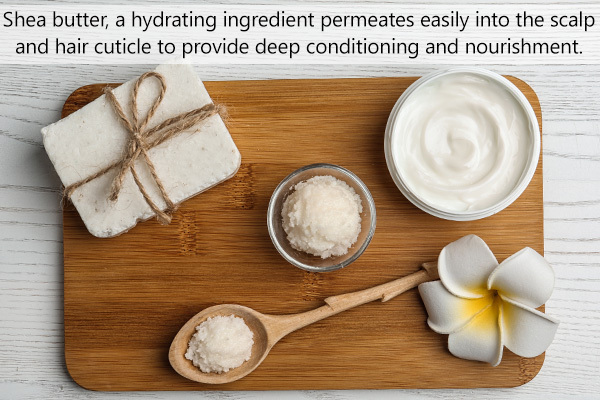
Shea butter is full of fatty acids that not only lubricate the hair and scalp but also form a thick protective layer over them to block out external irritants. This hydrating ingredient permeates easily into the scalp and hair cuticle to provide deep conditioning and nourishment.
Shea butter is especially good for repairing dry, damaged hair that is prone to breakage or falling out.
How to use:
Method 1
- Melt 1–2 tablespoons of raw shea butter in a double boiler or microwave.
- Mix 1 tablespoon of coconut or olive oil in the molten shea butter to make a hair mask. You can add 1 teaspoon of argan oil for extra hair benefits.
- Apply the mixture to your hair, starting from the roots down to the tips.
- Let it sit for 1–2 hours before rinsing it out with a mild shampoo and water.
- Use this hair mask once or twice a week for best results.
Method 2
- Cut a ripe avocado in half and remove the pit. Scoop out its flesh with a spoon and put it in a blender. Blend to make a smooth puree.
- Put ¼ cup of shea butter (preferably raw) and 1 teaspoon of sweet almond oil into the puree, and blend again to make a smooth paste.
- Apply the mask to your hair and scalp.
- Leave it in for 30–45 minutes before washing your hair thoroughly.
5. Try licorice root
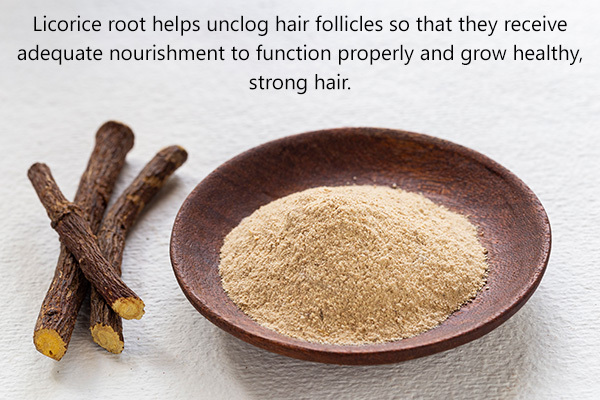
Licorice root helps unclog hair follicles so that they receive adequate nourishment to function properly and grow healthy, strong hair. (6)
How to use:
Method 1
- Mix 1 tbsp of licorice powder with 1–2 tbsp of yogurt to make a thick paste. Optionally, you can add 1 tsp of coconut oil to the mix.
- Apply the paste to your scalp.
- Cover your head with a shower cap, and let the mask get absorbed for 15 min.
- Rinse it off with a mild shampoo and lukewarm water.
Method 2
Drink a cup of licorice tea daily.
6. Prepare a Brahmi powder hair mask
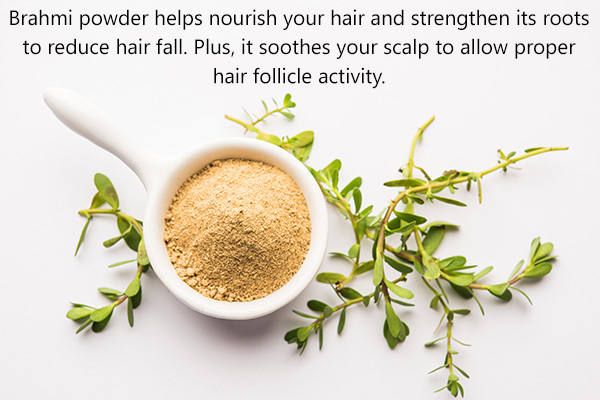
Brahmi powder helps nourish your hair and strengthen its roots to reduce hair fall. Plus, it soothes your scalp to allow proper hair follicle activity. Your hair follicles need a conducive environment to produce healthy hair, and brahmi powder helps facilitate that. (7)
You can easily get brahmi powder from a store; however, you cannot always be sure about its quality or purity.
So, it’s best to make it at home by drying fresh brahmi leaves in the sun and then grounding them into a fine powder. But if that is too much of a hassle, you can look for an unadulterated premium-quality brand in the market.
How to use:
Method 1
- Mix 2 tablespoons of brahmi powder in 1 cup of fresh coconut milk to make a smooth, thick paste.
- If the consistency is too runny, simply mix 1 teaspoon of yogurt into the mixture so that it becomes thicker.
- Generously apply this paste to your scalp and hair.
- Wait for it to dry before washing it off with normal water.
Method 2
- Put 2 tablespoons of brahmi powder, 1–2 hibiscus flowers, and 2–3 pieces of reetha (for hair cleansing effect) in a grinder.
- Add a little bit of water and blend all the ingredients to make a smooth, thick paste.
- Apply the paste to your scalp and hair.
- Let it sit for 30–45 minutes.
- Rinse it off with normal water.
- Use this mask once a week.
Lifestyle Changes and Tips to Manage Hair Thinning and Balding
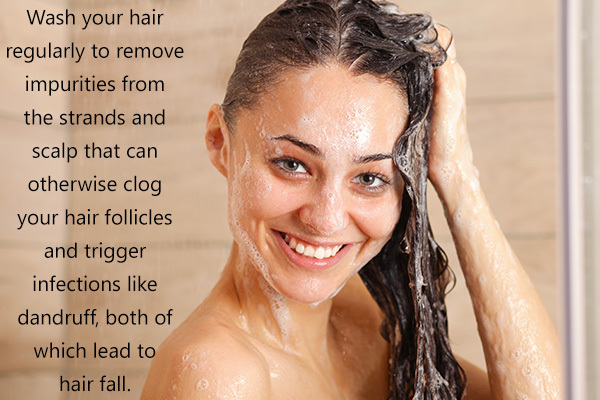
- Wash your hair regularly to remove impurities from the strands and scalp that can otherwise clog your hair follicles and trigger infections such as dandruff, both of which lead to hair fall.
- Be mindful about the hair products you use as they may contain harsh chemicals that can damage your hair in the long run. Look for mild shampoos and hydrating conditioners that are devoid of sulfates, parabens, and fragrances.
- Hair is at its weakest when wet or damp and can easily break or fall out during brushing or combing. So, let your hair dry before brushing/combing it. If you are in a hurry, use a wide-tooth wooden comb to gently detangle your damp hair to avoid undue hair loss. Also, don’t brush or comb too often as the constant pulling and friction can cause hair damage and hair fall.
- Stay hydrated by drinking plenty of water throughout the day.
- Quit smoking and limit your alcohol intake.
- Stress is known to trigger hair fall, so try to keep it under control. Stress releases a hormone called cortisol in the body, which hampers hair follicle function.
- You can practice deep breathing, yoga, and meditation to relax your mind and body. (8) Moreover, exercising at least 30 minutes a day works as a great stress buster. You can choose any form of exercise, such as brisk walking, jogging, swimming, biking, or a complete workout, according to your convenience. The idea is to stay active and be consistently so.
- Don’t use a towel to dry your hair. Rubbing your damp hair with a towel causes friction and pulling, which lead to undue breakage and shedding. Let your hair dry naturally instead.
- Don’t tie your hair too tightly as this puts a lot of strain on the hair roots, causing them to become weak. Similarly, styling your hair in the same way all the time exerts strain on specific areas of the scalp. As a result, the hair roots in those areas become weak over time, resulting in hair fall. So, it is recommended that you keep experimenting with new hairstyles but nothing too tight.
- If you are on any medication, make sure it does not cause hair fall as a side effect. If you suspect this to be the case, consult your doctor about a more suitable alternative.
Nutrients That Promote Hair Growth
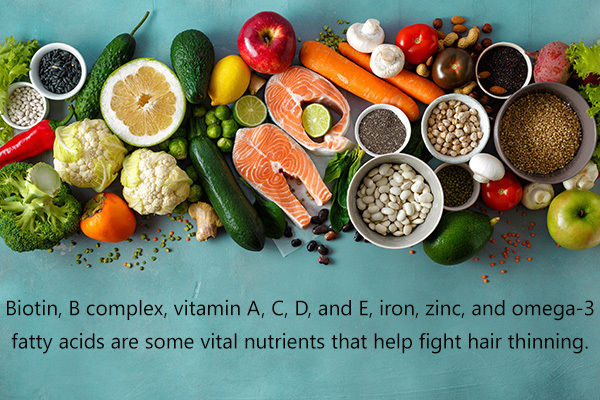
Although hair is primarily made up of a protein called keratin, certain other nutrients play a critical role in stimulating hair growth and reducing hair fall. (9)
The best way to get your recommended intake of these nutrients is through a wholesome diet, but if that is proving difficult, ask your doctor to put you on a supplement.
Here’s a list of some vital nutrients that help fight hair thinning:
- Biotin: Biotin is a B vitamin that is known to strengthen hair and accelerate the rate of hair growth. (10) Chicken is one of the best dietary sources of biotin.
- B complex: B vitamins are essential for the production of red blood cells that carry oxygen and nutrients to the hair follicles. Thus, B vitamins help provide better nourishment to the hair follicles so that they can generate new hair. Foods that are rich in these vital vitamins include blueberries and Greek yogurt.
- Vitamin A: Vitamin A is a fat-soluble vitamin that increases cell proliferation inside the hair follicles, resulting in speedy hair growth. Plus, it is known to enhance sebum production under the scalp to keep it naturally hydrated from within, an important prerequisite for healthy hair development. Carrots and sweet potatoes are good sources of vitamin A.
- Iron: Lack of iron in the body can increase hair fall. So, it is important that you fulfill your recommended intake by eating iron-rich foods such as spinach and quinoa.
- Vitamin C: Vitamin C is a powerful antioxidant that helps neutralize free radicals, which are unstable molecules that damage healthy cells and trigger inflammation. These free radicals can wreak havoc on your hair follicles, trigger scalp inflammation, and damage your cuticle. As mentioned earlier, iron deficiency can increase the risk of hair fall. Vitamin C facilitates better absorption of iron in the body to minimize this risk. Eat more of guava, tangerine, kiwi, and red bell pepper to get your needed dose of vitamin C.
- Vitamin D: Vitamin D can help activate dormant hair follicles to increase hair growth. Cow milk, soy milk, and oatmeal are good sources of vitamin D.
- Vitamin E: Vitamin E is credited with strong antioxidant activity that helps minimize free radical damage on the scalp and hair. The scalp inflammation caused by these free radicals has been associated with hair loss, which is why it is very important to keep it in check. Almonds and barley are rich in vitamin E, so consider adding them to your diet.
- Zinc: Zinc is crucial for building and repairing hair tissue. Oysters and chia seeds are all great food sources of zinc.
- Omega-3 fatty acids: Omega-3 fatty acids exhibit anti-inflammatory properties that can help soothe scalp inflammation and reduce the resulting hair fall. Scalp inflammation disrupts the proper functioning of hair follicles and weakens hair roots, triggering undue hair loss. Add oatmeal, walnut, salmon, avocado, and pumpkin seeds to your diet, all of which are replete with omega-3 fatty acids.
Common Myths About Hair Thinning
Here are some misconceptions regarding hair thinning that need to be debunked:
Androgenetic alopecia only affects older people
Androgenetic alopecia, also known as male- or female-pattern baldness, can start at any age. However, it generally sets in earlier in men than in women. For instance, men can develop it as early as their 20s, but women are typically affected as they near menopause. What begins as a receding hairline eventually paves the way for bald patches.
The American Hair Loss Association reports that nearly 66% of American males develop some degree of male-pattern baldness by the time they turn 35 years of age, which worsens as time passes. Moreover, about 85% of American men experience considerable hair thinning by the age of 50 years. (11)
As previously mentioned, male-pattern baldness in 20-year-olds is not unheard of, but it is relatively rare. Younger males are more prone to other forms of hair loss.
You’re going bald because you’re stressed
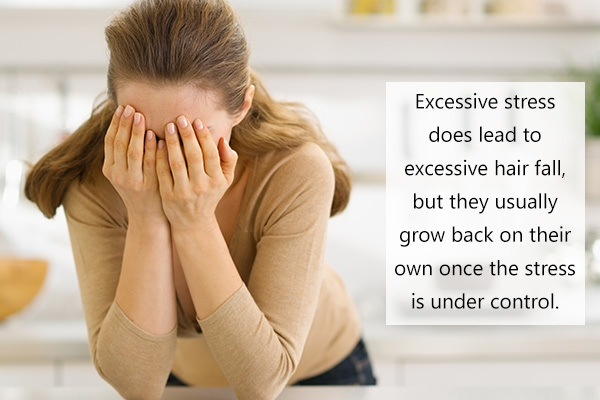
Excessive stress does lead to excessive hair fall, but they usually grow back on their own once the stress is under control. It can take 6–9 months to completely reverse this temporary hair loss.
What happens is that stress releases a hormone called cortisol in the body, which inhibits hair follicle activity and triggers excessive hair shedding.
Meanwhile, hair loss to the extent that you start going bald is more permanent in nature and is a sign of a medical condition called alopecia. (12) Stress can aggravate alopecia but does not cause this kind of irreversible hair loss.
Vitamins can stop hair loss
Certain vitamins are considered good for promoting hair growth and controlling hair fall, but they cannot stop or treat hair loss altogether.
Also, they are beneficial only when taken in the right amounts. In fact, excessive intake of some of these hair vitamins such as overdosing on vitamin E supplements can increase hair loss. (13) Your dermatologist will recommend these hair vitamins if you are running deficient.
Most-Asked Questions About Hair Thinning and Balding
If baldness runs in my family, will I lose my hair too?
People with a family history of hormonal (androgenetic) alopecia are more likely to develop it than those without any such family history. So, if you belong to this high-risk group and notice even the slightest sign of hair thinning, consult your dermatologist immediately to treat this condition in its early stages.
If left untreated, the hair loss can result in bald patches, which can be very difficult to reverse. Early treatment, on the other hand, will help minimize hair loss and regrow the little hair that has been lost.
How much hair fall is normal?
Up to 100 hair strands can be lost daily as part of the normal hair growth cycle. But if you start shedding much more hair per day, it could be telogen effluvium, which is excessive hair loss. Always consult your doctor for a proper diagnosis.
Does excessively washing or shampooing your hair cause hair loss?
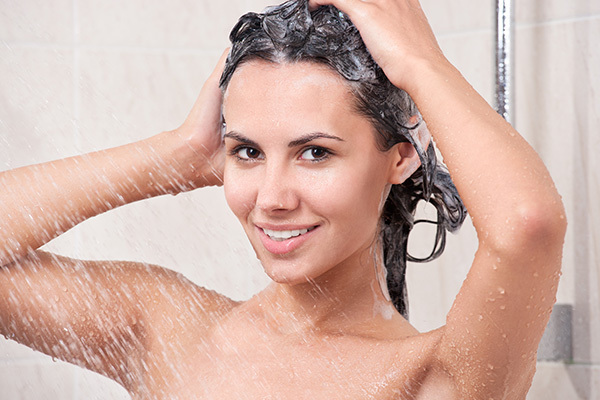
No, frequent hair washing or shampooing does not trigger hair loss. People often harbor this misconception because of the chunks of hair that come out during a hair wash. However, this is just hair that has grown to its full length, detached from the hair follicle, and is ready to fall out; it would shed anyway.
However, the process of scrubbing and washing your hair makes it easier. This hair shedding is a natural part of the hair growth cycle. Each strand grows to its maximum length, then remains dormant for a while, and then falls out to allow the growth of a new hair in its place.
Do frequent haircuts facilitate faster and thicker hair growth?
No, haircuts will have no impact on the speed or quality of your hair growth.
Final Word
The treatment for hair loss depends on its severity and underlying cause and is best determined by a dermatologist. Including the above-listed home remedies in your hair care regimen is a useful extra step towards minimizing hair loss.

- Was this article helpful?
- YES, THANKS!NOT REALLY


